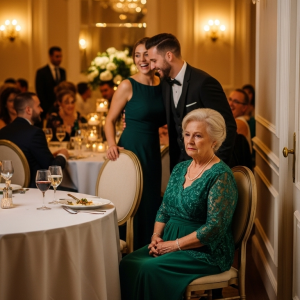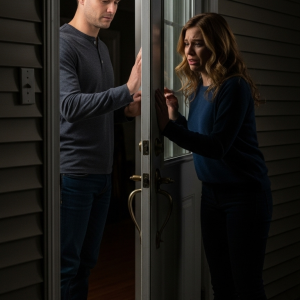I’m 16 years old. My parents, who never married, share custody, so I switch homes every month. For the past three years, my life at my mother’s house has been governed by a strange, unspoken rule: my stepfather, Eddie, and his two sons pretend I don’t exist.
It didn’t start that way. When my mom first began dating Eddie, he was friendly. But one day, he just stopped. He wouldn’t make eye contact. He would turn his face away when I entered a room. His sons, aged 15 and 12, followed his lead. For three years, I have lived part-time in a house where the only person who speaks to me is my mother. It’s the weirdest, most isolating experience you can imagine. You start to feel like a ghost, or worse, a criminal whose crime is a mystery even to himself.
When I begged my mom to explain, she’d give me the same tired speech. “That’s just the way he is,” she’d say. “He has his reasons. After all the sacrifices I’ve made for you, can’t you just do this one thing for me? Just deal with it.” The sacrifices. She had to stay in the same city as my dad for my sake, giving up promotions. She rejected suitors to focus on me. I never asked for any of it, but these sacrifices were the currency she used to buy my silence, my compliance. I loved her and wanted her to be happy, so I dealt with it. I never even told my dad, fearing it would ignite a massive custody battle. So I endured the silence.
Until last month. I was at my mother’s house, going through a rough patch with my friends at school and feeling more isolated than usual. I woke up one Tuesday morning to a house that was completely, utterly empty. No note, no text, nothing. Just silence.
I called my mom, my heart pounding with a vague sense of dread. She answered, her voice cheerful. “Oh, hi sweetie! Is everything okay?” “Where is everyone?” I asked. “Oh, we decided to take a little road trip for the week! Me, Eddie, and the boys. Fun, right? Just stay and take care of the house for us.” A trip. They had packed, planned, and left for a week-long family vacation without a single word to me. I wasn’t a part of their family; I was the housesitter they forgot to inform. “You didn’t even tell me,” I said, my voice shaking. “Don’t make a big deal out of this,” she sighed, her tone already laced with impatience. “Just be a good boy and watch the house.” She hung up before I could respond and didn’t answer when I called back. I stood in the silent house, the weight of three years of being ignored crashing down on me. I was done. I packed a bag, locked up the house, and went to my dad’s.
My dad was surprised to see me, but when I finally broke down and told him everything—the years of silent treatment, my mom’s guilt trips, the secret vacation—his face hardened. “You’re staying here,” he said, his voice firm. “This is over. I’ll handle your mother.” For five days, I felt a weight lift off my shoulders. I had no contact with my mom, and strangely, she made no effort to contact me. The son she’d left alone in an empty house wasn’t even worth a text message.
Then, she called. I answered, expecting a half-hearted apology or a demand to know where I was. Instead, I was met with a torrent of screaming. “THE HOUSE WAS ROBBED! EVERYTHING IS GONE! THIS IS YOUR FAULT!” It took me a few seconds to process. Robbed? Apparently, someone had broken in and stolen their television and other expensive items. And somehow, she was blaming me. “I tried to call you!” I shouted back. “I tried to tell you I was leaving, but you wouldn’t answer your phone!” “You could have texted!” she shrieked. “I was mad! You left me alone without a word!”
We got into a massive fight, her convinced I should have stayed no matter what, me furious that she was trying to pin this on me. Then she put Eddie on the phone. For the first time in years, my stepfather spoke to me. His voice was a low, venomous snarl. “I always knew you would be the cause of our ruin,” he hissed, before hanging up. The cause of our ruin? The words made no sense. We didn’t even interact. How could he have come to that conclusion? My mom and dad started fighting over the phone, with her demanding my dad pay for the damages since he was defending my actions. It was a complete mess.
Two weeks after the incident, a lot of things came to light. The truth was uglier than anything I could have imagined. Eddie, pushed to the brink by my mother’s refusal to disown me after the robbery, finally learned why he had been taught to hate me. He sent me an email. An apology. And an explanation.
It turns out that when they first started dating, Eddie had wanted his ailing mother, who had a full-time nurse, to move in with them. My mother, not wanting the “extra baggage” of a sick mother-in-law, had refused. But instead of being honest with him, she invented a monstrous lie. She pinned it all on me.
Eddie’s email laid it all out. My mother had told him I was a juvenile delinquent, a deeply troubled teenager who had terrorized her past boyfriends because I was obsessed with reuniting my biological parents. She told him I had referred to his sick mother as a “useless burden on the family” and that I had threatened to make her life miserable if she moved in. She told him I had called his two grieving sons “little evil goblins who were going to ruin our family.”
He believed her. Why wouldn’t he? He trusted the woman he loved. And so, he had cut me out of his life, teaching his sons to do the same, all to protect his family from the monster my mother had created out of thin air. The robbery, he now realized, was just the final straw in a long line of “trouble” she had fabricated about me. My mom had been feeding him lies for years—that I was getting in trouble at school, that I was difficult and resentful. Since he never spoke to me, he never had a chance to find out I was just a normal kid. It was the perfect, twisted system.
“He had been pushing my mother to disown me,” the email continued. “She didn’t want to, so she finally had to come clean. I cannot believe I treated you so badly over a bunch of lies. I am so sorry for everything I put you through. I hope one day you can forgive me.”
I sat there, reading the email over and over, the past three years of my life snapping into horrifying focus. It wasn’t me. It was never me. My mother had allowed me to be mistreated, to feel like an outcast in her home, all to cover up her own selfishness. She had used me as a shield.
The collapse of my mother’s world was swift and total. Eddie, disgusted by her years of deceit, immediately moved out and filed for divorce. My mother sent my dad a flood of desperate messages, begging him to talk to Eddie, to “fix this,” because she couldn’t live without “all of us.”
My father, now knowing the full extent of her manipulation, did the opposite. He filed for full custody of me.
My mother’s reaction to this was bizarre. She took to social media, posting sad, vague quotes about heartbreak and family, as if she were the victim in all of this. My cousins sent me screenshots. It was pathetic. She had dug her own grave with her lies, and now she was trying to decorate it with inspirational quotes.
The custody battle was short. My mother put up a fight, but the evidence was overwhelming. Eddie’s testimony, his apology email to me, and the clear pattern of manipulation made it an open-and-shut case. She really didn’t stand a chance.
My dad now has full custody of me. It’s been a few months, and the dust is starting to settle. I don’t have to go to my mother’s house anymore. She gets visitation rights, but I have no desire to see her. I have blocked her everywhere.
I spent so long wondering what I did wrong, why I was being hated for no reason. All that time, she was just protecting herself, serving her own needs. She put her happiness first, and I had been conditioned to do the same. Well, not anymore.
Life with my dad is calm. It’s normal. I’ve made up with my friends from school, and I’m looking forward to moving on. The silence in this house isn’t oppressive; it’s peaceful. Eddie’s divorce is final. My mother is alone, a queen in a castle of her own lies. Sometimes I feel a twinge of sadness for her, but then I remember the cold, invisible walls of that house, and the feeling passes. I didn’t cause her ruin. Her own actions did. I am finally free.




